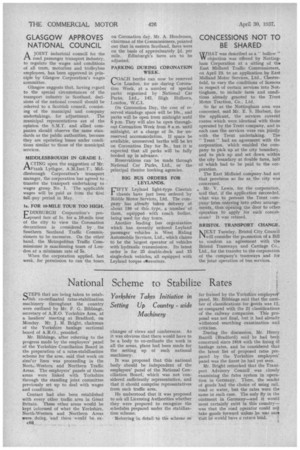National Scheme to Stabilize Rates
Page 122

If you've noticed an error in this article please click here to report it so we can fix it.
Yorkshire Takes Initiative in Setting Up Country wide Machinery
STEPS that are being taken to establish co-ordinated rates-stabilization machinery throughout the country were outlined by Mr. F. G. Bibbings, secretary of A.R.O. Yorkshire Area, at a hauliers' meeting at Bradford, on Monday. Mr. J. M. Bright, chairman of the Yorkehire haulage sectional board of A.R.O., presided.
Mr. Bibbings, after referring to the progress made by the employers' panel of the Yorkshire Conciliation Board in the preparation of a rates-stabilization scheme for the area, said that work on simi'ar lines was proceeding in the Norte-Western and Northern Traffic Areas. The employers' panels of those areas were linked with Yorkshire through the standing joint committee previously set up to deal with wages and conditions.
Contact bad also been established with every other traffic area in Great Britain. These other. areas would be kept informed of what the Yorkshire, North-Western and Northern Areas were doing, and there would be. ex changes of views and conferences. As it was obvious that there would have to be a body to co-ordinate the work in all the areas, plans had been made for the setting up of such national machinery.
It was proposed that this national body should be independent of the employers' panel of the National Conciliation Board, which was not considered sufficiently representative, and that it should comprise representatives from each traffic area.
He understood that it was proposed to ask all Licensing Authorities whether they were prepared to recognize the schedules prepared under the stabilization scheme.
Referring in detail to the scheme so far framed by the Yorkshire employer' panel, Mr. Bibbings said that the number of classifications for• goods was 12, as compared with the 21 classifications of the railway companies. This proposal was not final, but it had already withstood searching examination and criticism.
During the discussion, Mr. Henry Burrill (Bradford) said be had been concerned since 1910 with the fixing Of haulage rates, and he considered that the latest list of proposed rates prepared by the Yorkshire employers' panel was the finest lie had yet seen. Mr. Bright remarked that the Transport Advisory Council was closely examining the rates system in operation in Germany. There, the sender of goods had the choice of using rail, road or water, but the rates were the same in each case. The only fly in the ointment in Germany—and it would most certainly exist in this country— was that the road operator could ric% take goods forward unless be was sure that he would have a return load.








































































































































































